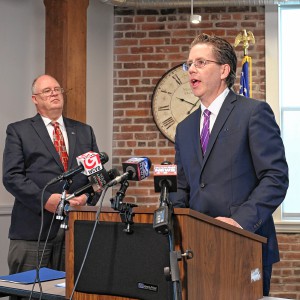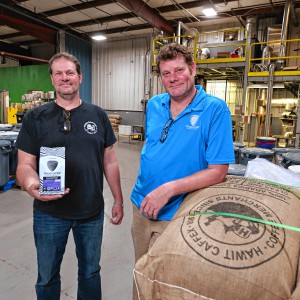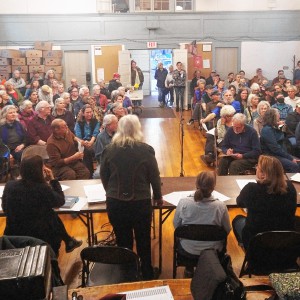Public advised to avoid rivers following sewage discharges in Greenfield, Montague
| Published: 07-17-2023 5:34 PM |
For the third time in just over a week, heavy rains led to the discharge of untreated sewage and waste mixed with stormwater at locations in Greenfield and Montague that have impacted parts of three Franklin County rivers and made swimming unsafe.
In Greenfield, the Department of Public Works discovered a sanitary sewer overflow on Sunday morning at a regulator chamber outfall behind 302 Deerfield St.
Although the overflow concluded at 3:45 p.m. the same day, officials are advising people to avoid contact with the Green River and Deerfield River in Greenfield, as well as the Connecticut River in Deerfield, Montague and Sunderland, for 48 hours after the discharge or overflow ceased due to increased health risks from bacteria and other pollutants. Officials expect to lift the advisory Tuesday at 3:45 p.m.
Greenfield Public Works Director Marlo Warner II emphasized there is no impact on the drinking water supply. The primary concern is swimming areas downstream (south) of the regulator chamber outfall.
The overflow resulted in the discharge of 90,000 gallons of untreated sewage into the river, according to a statement from the city. At its height, sewage was discharging at a rate of 529 gallons per minute.
“We’ve had two really large rain events in the last two weeks,” Warner said Monday. According to the National Weather Service, there were 6 to 10 inches of observed precipitation in the area over the last 14 days, with some parts of the county seeing even more. “Before the last two weeks, we hadn’t had an overflow in quite some time.”
Warner noted there have also been changes in state law with respect to notifying the public of such events.
On Monday, July 10, a sanitary sewer overflow at the same location along the Green River that occurred from around noon to 5:24 p.m. resulted in the discharge of roughly 142,290 gallons of untreated sewage. The sewage discharged at a rate of 459 gallons per minute.
Article continues after...
Yesterday's Most Read Articles
 1989 homicide victim found in Warwick ID’d through genetic testing, but some mysteries remain
1989 homicide victim found in Warwick ID’d through genetic testing, but some mysteries remain
 Fogbuster Coffee Works, formerly Pierce Brothers, celebrating 30 years in business
Fogbuster Coffee Works, formerly Pierce Brothers, celebrating 30 years in business
 Greenfield homicide victim to be memorialized in Pittsfield
Greenfield homicide victim to be memorialized in Pittsfield
 Real Estate Transactions: May 3, 2024
Real Estate Transactions: May 3, 2024
 Battery storage bylaw passes in Wendell
Battery storage bylaw passes in Wendell
 As I See It: Between Israel and Palestine: Which side should we be on, and why?
As I See It: Between Israel and Palestine: Which side should we be on, and why?
“We’re obviously not sure if our inflow situation has worsened; I’m going to say it has not,” Warner said, referring to the process in which stormwater quickly flows into the sewer pipes. “It’s because of the heavy, heavy rains in a short amount of time. We are making strides in inflow and infiltration.”
In Montague, meanwhile, officials identified a sewer overflow Sunday morning along Greenfield Road that affected the Connecticut River in Montague and Greenfield, according to an interactive map on the town website. Overflows at this outfall average about 10,654 gallons, according to the town’s combined sewer overflow data.
There were also three overflows recorded at an outfall between 7th and L streets between 6:25 a.m. and 10:30 a.m. Overflows at this outfall, which occur at an average of 30,619 gallons, also affect the Connecticut River in Montague and Greenfield.
Montague Department of Public Works Superintendent Tom Bergeron stressed that these estimates are based on historic averages per overflow incident over the past three years. He noted his department is unsure of how much sewage overflowed in Montague on Sunday, specifically.
Montague has a 750-foot regulator chamber running underneath Avenue A that brings discharge to the Clean Water Facility to lessen the amount of untreated sewage that enters the Connecticut River, according to Bergeron.
Sewer overflows continued to impact the Connecticut River outside of Franklin County as well. The city of Holyoke reported combined discharges of nearly 6.58 million gallons directly into the Connecticut River on Sunday. Additionally, public works officials in Northampton reported a discharge of less than 500 gallons of untreated waste to Barrett Street Brook.
According to Kelsey Wentling, river steward for the Connecticut River Conservancy advocacy group, about 0.52 million gallons of sewage was discharged into the Connecticut River during a particularly rainy summer in 2021.
“I think when we have these really intense periods of rainfalls and flooding events, we perhaps take for granted what we have during dryer times,” she said.
Aside from heightened levels of E. coli bacteria, sewer overflows include stormwater that flushes chemicals, trash and other pollutants into the waterways, Wentling explained. In addition, these overflows can cause the “nutrient loading” of nitrogen and phosphorous, which results in algae blooms that block sunlight and disrupt oxygen cycles in the ecosystem.
Wentling said incidents of sewage overflow serve as reminders for municipalities to prioritize adequate urban design, promote green infrastructure and reassess how money is spent.
“For many people, it’s ‘out of sight, out of mind,’” Wentling expressed, “but we need to be investing in this … because it has this immediate impact on river health.”
In other environmental news, there’s one silver lining to the relentless rain: Massachusetts is no longer in a drought.
Energy and Environmental Affairs Secretary Rebecca Tepper on Monday declared a return to normal for all seven regions of the state.
“After a week of devastating floods in western Massachusetts, it should not come as a surprise that the drought has lifted,” Tepper said in a statement.
State officials expect precipitation to remain above average, along with slightly above-average temperatures, for the rest of July.
A mild drought had been declared for the western region and Cape Cod in early June, after Massachusetts finally emerged from its 2022 drought in February 2023.
Reporter Mary Byrne can be reached at mbyrne@recorder.com or 413-930-4429. Twitter: @MaryEByrne. Reach Julian Mendoza at 413-772-0261, ext. 261 or jmendoza@recorder.com. Daily Hampshire Gazette reporter James Pentland contributed to this article.

 Wear Orange organizers prepare display to remember gun violence victims
Wear Orange organizers prepare display to remember gun violence victims Deerfield candidates, Whately incumbent discuss issues with voters at South County Senior Center
Deerfield candidates, Whately incumbent discuss issues with voters at South County Senior Center
